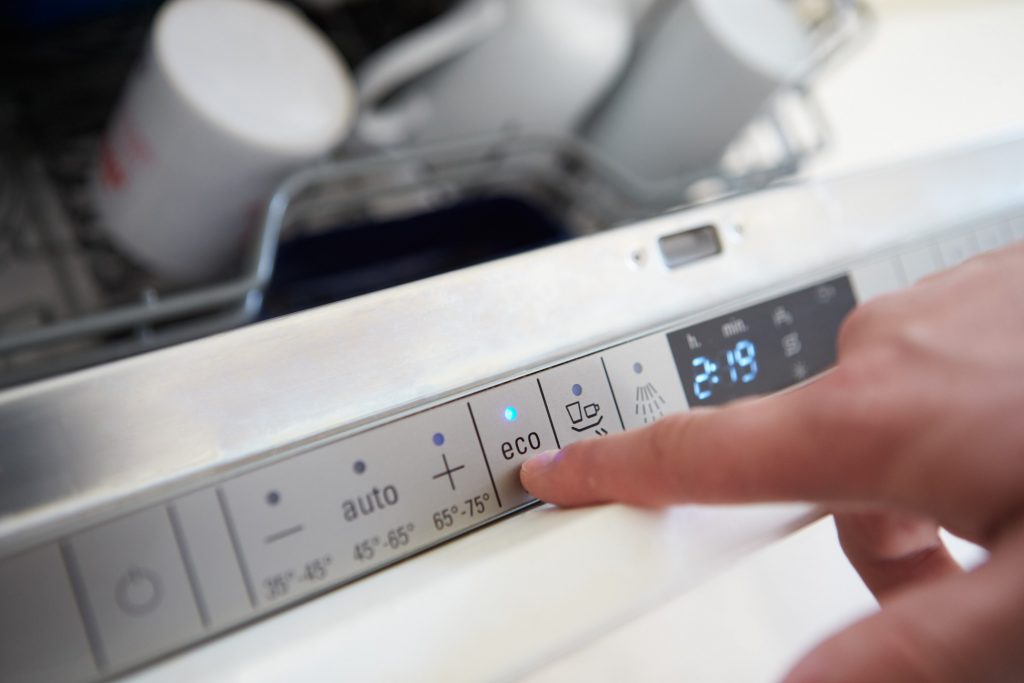Blog
How to Improve Dishwasher Performance
If you’re accustomed to having a dishwasher, you know just how time-consuming and labor intensive handwashing a sink-full of dishes can be. Now you can avoid that headache pretty much any time you like.
As for dishwashers, today’s models offer maximum energy efficiency and whisper quiet operation, making after-dinner cleanup a breeze. Yet every now and then, we all have the unfortunate experience of opening the dishwasher door to find spots on glasses and food residue on plates. What gives?
Like all appliances, regular maintenance can help keep your dishes sparkling clean and your dishwasher operating at peak performance for many years. Follow these useful tips to do just that.

Scrape off the gunk. Even a brand spanking new dishwasher that claims you don’t need to rinse off the dishes will operate better and last longer if it doesn’t get food residue stuck in its system. Scrape off leftover food and, if your dishwasher is an older model, pre-rinse dishes.
Use hot water. Hot water does a better job of cleaning dishes than cold, so run wash cycles on the hottest water possible. Looking for ways to save a few bucks on utility bills? Open the dishwasher door after the cycle is complete and allow dishes to air dry instead of using the heat-dry option.
Check your water. Hard water can leave a residue on dishes, glassware, and utensils. If your dishes come out spotty or filmy, have your household water supply tested. If the mineral content is higher than recommended, you may choose to have a water softener installed.
Don’t overload. Sure, you want to run full loads to maximize energy efficiency but overloading the dishwasher can prevent water from reaching all surfaces and may require you to wash them again.
Choose wisely. Don’t just pick your cycle selection willy-nilly. Most dishwashers have regular, heavy-duty, and light cycle options to choose from depending on the type of load you’re washing.
Inspect for clogs. Over time, clogs may develop in the drain and spray arm. Check the holes in the spray arm routinely and use a toothpick to dislodge any food residue or hard water mineral deposits. While you’re at it, check the trap and drain for food scraps and residue that could cause a blockage.
Wash the dishwasher. That’s right, even your dishwasher needs an occasional good cleaning. Remove all racks and utensil trays and wipe down the walls of the machine with a solution of white vinegar and baking soda. Use an old toothbrush to scrape off food particles. Rinse thoroughly with clean water. For regular cleaning, place two cups of white vinegar on the top rack of the dishwasher and run a full, normal cycle.
As you can see, hard water can make the job tougher. Hard water causes other problems, too, like internal pipe corrosion, dirty laundry issues, plus a build-up of soap scum in your tub and shower. If these symptoms are visible in your home, contact Messmer Mechanical for a professional water quality test and, if appropriate, a free water treatment proposal.
Our Service Partners Get it All.
Enroll in our Service Partner Plan and enjoy added value plus proactive greater and protection for your home comfort equipment.
- Annual inspections
- Lower energy costs
- Priority service
- Fewer repairs
- 10% off heating & cooling repairs identified during annual preventive maintenance
- Annual Plan Renewal
- And more
Become a Plan Member and take advantage of the savings today!
